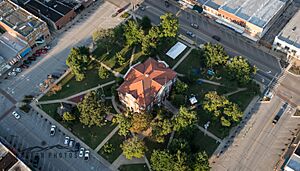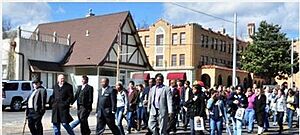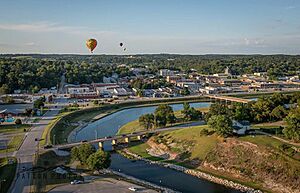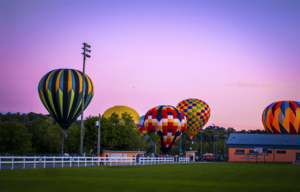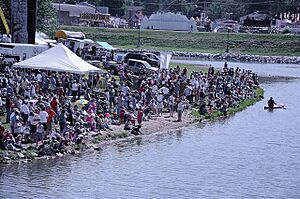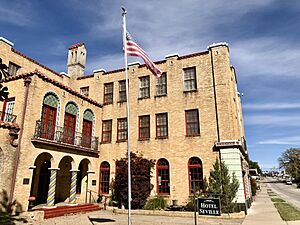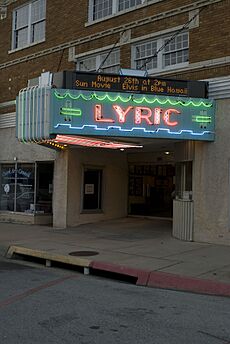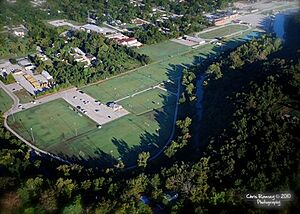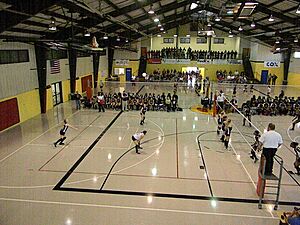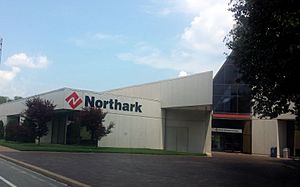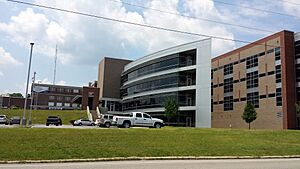Harrison, Arkansas facts for kids
Quick facts for kids
Harrison
|
||
|---|---|---|
|
City
|
||
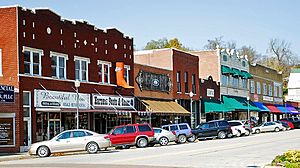
Historic downtown Harrison
|
||
|
||
| Motto(s):
"Adventure Awaits You"
|
||
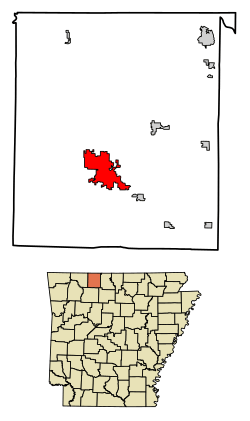
Location of Harrison in Boone County, Arkansas.
|
||
| Country | United States | |
| State | Arkansas | |
| County | Boone | |
| Platted | 1869 | |
| Incorporated | March 1, 1876 | |
| Government | ||
| • Type | Council government | |
| Area | ||
| • Total | 11.23 sq mi (29.09 km2) | |
| • Land | 11.21 sq mi (29.02 km2) | |
| • Water | 0.03 sq mi (0.07 km2) | |
| Elevation | 1,247 ft (380 m) | |
| Population
(2020)
|
||
| • Total | 13,069 | |
| • Estimate
(June 30, 2023)
|
13,100 | |
| • Density | 1,166.35/sq mi (450.35/km2) | |
| Time zone | UTC−6 (Central (CST)) | |
| • Summer (DST) | UTC−5 (CDT) | |
| ZIP codes |
72601-72602
|
|
| Area code(s) | 870 | |
| FIPS code | 05-30460 | |
| GNIS feature ID | 2403805 | |
Harrison is a city in Boone County, Arkansas, United States. It is also the county seat, which means it's where the county government is located. The city was named after Marcus LaRue Harrison, a surveyor who planned the city near Crooked Creek.
In 2020, Harrison had a population of 13,069 people. It is the main city in the Harrison Micropolitan Statistical Area, which includes Boone and Newton counties.
The community has faced challenges related to race in its past. There were difficult events in the early 1900s, and some groups promoting extreme views were present later on. However, city leaders and community members have worked to promote understanding and improve the city's image.
Contents
History
Early History of the Area
Long ago, Native Americans were the first people to live in this area. Some of them were "cliff dwellers" who lived in caves along the rivers. Later, the Osage tribe was very important in the Ozarks. Other tribes like the Shawnee, Quapaw, and Caddo also knew the area well.
Around 1816, the Cherokee arrived, but they often had conflicts with the Osage. By the 1830s, both tribes were moved to what was called Indian Territory.
It's possible that some of the first Europeans to visit were explorers with Hernando de Soto. However, it's more likely that French hunters or trappers explored the area by following the White River.
How Harrison Began
In 1857, a group of travelers known as the Baker–Fancher wagon train gathered near Harrison. Sadly, many members of this group were later killed in Utah. A monument in Harrison's town square remembers these victims.
Boone County was officially formed in 1869, after the Civil War. Harrison was planned out and chosen as the county seat. It was named after Marcus LaRue Harrison, a Union officer who helped survey the town. Harrison became an official city on March 1, 1876.
Challenges in the 20th Century
Difficult Times in the Early 1900s
In the early 1900s, Harrison experienced some difficult events related to race. These events led to many Black residents leaving the community. Harrison became known as a "sundown town", a place where African Americans were not allowed to live or stay after dark.
In 1901, a new railroad helped Harrison's economy grow. But when the railroad went bankrupt in 1905, times became tough. In October 1905, a group of white people forced two Black prisoners out of town. They also burned houses and fired guns in the Black community, telling people to leave. One railroad worker, George Richards, died during this time. Local police did not take action against those involved.
In January 1909, another serious event occurred. A Black man named Charles Stinnett was arrested. A large group of people gathered at the jail, causing many remaining Black residents to leave Harrison. Stinnett was later executed.
Later 20th Century Events
In 1921, a famous bank robber named Henry Starr tried to rob a bank in Harrison. He was shot by the bank's former president and died the next day.
On May 7, 1961, heavy rain caused Crooked Creek to flood Harrison. The downtown area was covered in water, reaching up to 8 feet inside buildings. Many small buildings and cars were washed away. Four people died, and most of the business district was destroyed, with damages over $5.4 million.
In 1962, Sam Walton opened his second Walmart store in Harrison.
In 1982, a group called Kingdom Identity Ministries, which has been identified as promoting extreme views, was started in Harrison.
Harrison in the 21st Century
Since 2003, Harrison has had a Community Task Force on Race Relations. This group works to "promote diversity and respond to racial-bias accusations against the city." City leaders have tried to counter extreme views by holding educational events and putting up billboards that promote tolerance. They also work to improve the city's image.
In 2014, a peace march celebrating Martin Luther King Jr. was held in downtown Harrison. This event was hosted by the Arkansas Martin Luther King Jr. Commission. In the same year, a monument honoring Confederate history was dedicated in Harrison.
In 2017, the Mayor and Boone County Judge signed statements recognizing June as Confederate Heritage and History Month.
Kevin Cheri, the first African-American person to work in the area in 1978, faced challenges and left. He returned in 2007. In 2019, Mayor Jerry Jackson recognized him when Harrison issued its first-ever Black History Month proclamation.
In June 2020, about 300 people gathered in Harrison to protest police actions related to the death of George Floyd. A smaller group of armed people with flags also watched.
As of October 2023, the Southern Poverty Law Center states that Kingdom Identity Ministries still has a location in Harrison.
Geography
Several major roads, including U.S. Routes 62, 65, and 412, pass through Harrison. U.S. 65 goes north to Branson, Missouri, and south to Conway, Arkansas. U.S. 62 goes west to Eureka Springs and beyond. U.S. 412 goes west to Springdale. U.S. 62 and 412 together go east to Mountain Home.
The city covers about 11.23 square miles (29.09 square kilometers). Most of this area is land, with a small amount of water.
Climate
Harrison has a humid subtropical climate. This means it has hot, humid summers and winters that are usually mild to cool.
| Climate data for Harrison, Arkansas (1991–2020 normals, extremes 1891–present) | |||||||||||||
|---|---|---|---|---|---|---|---|---|---|---|---|---|---|
| Month | Jan | Feb | Mar | Apr | May | Jun | Jul | Aug | Sep | Oct | Nov | Dec | Year |
| Record high °F (°C) | 81 (27) |
87 (31) |
98 (37) |
99 (37) |
99 (37) |
105 (41) |
112 (44) |
112 (44) |
106 (41) |
96 (36) |
86 (30) |
82 (28) |
112 (44) |
| Mean daily maximum °F (°C) | 46.8 (8.2) |
51.6 (10.9) |
60.0 (15.6) |
69.2 (20.7) |
76.9 (24.9) |
85.0 (29.4) |
89.4 (31.9) |
89.5 (31.9) |
81.8 (27.7) |
71.3 (21.8) |
59.3 (15.2) |
49.1 (9.5) |
69.2 (20.7) |
| Daily mean °F (°C) | 37.5 (3.1) |
40.8 (4.9) |
49.4 (9.7) |
58.3 (14.6) |
66.9 (19.4) |
74.9 (23.8) |
78.9 (26.1) |
78.3 (25.7) |
70.7 (21.5) |
59.9 (15.5) |
48.5 (9.2) |
39.9 (4.4) |
58.7 (14.8) |
| Mean daily minimum °F (°C) | 28.1 (−2.2) |
30.0 (−1.1) |
38.8 (3.8) |
47.3 (8.5) |
56.8 (13.8) |
64.8 (18.2) |
68.3 (20.2) |
67.0 (19.4) |
59.5 (15.3) |
48.5 (9.2) |
37.7 (3.2) |
30.7 (−0.7) |
48.1 (8.9) |
| Record low °F (°C) | −18 (−28) |
−20 (−29) |
−10 (−23) |
20 (−7) |
26 (−3) |
40 (4) |
41 (5) |
41 (5) |
30 (−1) |
16 (−9) |
5 (−15) |
−6 (−21) |
−20 (−29) |
| Average precipitation inches (mm) | 2.96 (75) |
2.80 (71) |
4.20 (107) |
5.17 (131) |
5.54 (141) |
4.17 (106) |
3.74 (95) |
3.36 (85) |
4.40 (112) |
4.02 (102) |
3.88 (99) |
3.22 (82) |
47.46 (1,205) |
| Average snowfall inches (cm) | 2.2 (5.6) |
3.4 (8.6) |
2.2 (5.6) |
0.0 (0.0) |
0.0 (0.0) |
0.0 (0.0) |
0.0 (0.0) |
0.0 (0.0) |
0.0 (0.0) |
0.0 (0.0) |
0.2 (0.51) |
1.5 (3.8) |
9.5 (24) |
| Average precipitation days (≥ 0.01 in) | 7.1 | 7.2 | 10.8 | 10.5 | 11.2 | 8.4 | 9.1 | 8.8 | 7.6 | 8.2 | 8.0 | 8.9 | 105.8 |
| Average snowy days (≥ 0.1 in) | 1.5 | 2.1 | 1.0 | 0.1 | 0.1 | 0.0 | 0.0 | 0.0 | 0.0 | 0.0 | 0.2 | 1.1 | 6.1 |
| Source: NOAA | |||||||||||||
| Climate data for Harrison, Arkansas (Boone County Airport) (1991–2020 normals, extremes 1948–present) | |||||||||||||
|---|---|---|---|---|---|---|---|---|---|---|---|---|---|
| Month | Jan | Feb | Mar | Apr | May | Jun | Jul | Aug | Sep | Oct | Nov | Dec | Year |
| Record high °F (°C) | 79 (26) |
87 (31) |
91 (33) |
92 (33) |
94 (34) |
107 (42) |
107 (42) |
112 (44) |
103 (39) |
92 (33) |
84 (29) |
78 (26) |
112 (44) |
| Mean daily maximum °F (°C) | 46.9 (8.3) |
51.2 (10.7) |
60.3 (15.7) |
69.6 (20.9) |
76.6 (24.8) |
84.9 (29.4) |
89.1 (31.7) |
88.7 (31.5) |
81.4 (27.4) |
70.8 (21.6) |
59.0 (15.0) |
49.2 (9.6) |
69.0 (20.6) |
| Daily mean °F (°C) | 37.0 (2.8) |
40.9 (4.9) |
49.2 (9.6) |
58.3 (14.6) |
66.2 (19.0) |
74.4 (23.6) |
78.5 (25.8) |
77.6 (25.3) |
69.9 (21.1) |
59.4 (15.2) |
48.5 (9.2) |
39.7 (4.3) |
58.3 (14.6) |
| Mean daily minimum °F (°C) | 27.2 (−2.7) |
30.6 (−0.8) |
38.1 (3.4) |
47.0 (8.3) |
55.8 (13.2) |
63.9 (17.7) |
67.9 (19.9) |
66.5 (19.2) |
58.5 (14.7) |
48.0 (8.9) |
38.0 (3.3) |
30.2 (−1.0) |
47.6 (8.7) |
| Record low °F (°C) | −13 (−25) |
−9 (−23) |
−9 (−23) |
22 (−6) |
32 (0) |
46 (8) |
50 (10) |
48 (9) |
33 (1) |
21 (−6) |
8 (−13) |
−11 (−24) |
−13 (−25) |
| Average precipitation inches (mm) | 2.67 (68) |
2.42 (61) |
3.91 (99) |
4.98 (126) |
4.81 (122) |
3.85 (98) |
3.67 (93) |
3.42 (87) |
4.06 (103) |
3.81 (97) |
3.96 (101) |
2.94 (75) |
44.50 (1,130) |
| Average precipitation days (≥ 0.01 in) | 8.2 | 7.7 | 10.4 | 9.9 | 11.8 | 9.2 | 9.3 | 8.1 | 8.0 | 9.1 | 8.4 | 8.1 | 108.2 |
| Source: NOAA | |||||||||||||
Population Information
| Historical population | |||
|---|---|---|---|
| Census | Pop. | %± | |
| 1880 | 582 | — | |
| 1890 | 1,438 | 147.1% | |
| 1900 | 1,551 | 7.9% | |
| 1910 | 1,602 | 3.3% | |
| 1920 | 3,477 | 117.0% | |
| 1930 | 3,626 | 4.3% | |
| 1940 | 4,238 | 16.9% | |
| 1950 | 5,542 | 30.8% | |
| 1960 | 6,580 | 18.7% | |
| 1970 | 7,239 | 10.0% | |
| 1980 | 9,567 | 32.2% | |
| 1990 | 9,922 | 3.7% | |
| 2000 | 12,152 | 22.5% | |
| 2010 | 12,943 | 6.5% | |
| 2020 | 13,069 | 1.0% | |
| U.S. Decennial Census | |||
2020 Census Details
| Race | Number | Percentage |
|---|---|---|
| White (non-Hispanic) | 11,501 | 88.0% |
| Black or African American (non-Hispanic) | 53 | 0.41% |
| Native American | 85 | 0.65% |
| Asian | 148 | 1.13% |
| Pacific Islander | 14 | 0.11% |
| Other/Mixed | 766 | 5.86% |
| Hispanic or Latino | 502 | 3.84% |
In 2020, Harrison had 13,069 people living in the city. There were 5,578 households and 3,198 families.
2010 Census Details
According to the 2010 census, Harrison had 12,943 people and 6,043 homes. Most of the population (96.2%) was White. About 2.2% of the population was Hispanic or Latino.
About 23.2% of the people were under 18 years old. Also, 19.0% were 65 years or older. Females made up 53.1% of the population, and males made up 46.9%.
The average household income from 2007-2011 was $33,244. About 15.1% of the people lived below the poverty line. The average value of homes owned by residents was $108,700.
Economy
Harrison is home to the main office of FedEx Freight. This company is a major carrier for shipping goods in smaller amounts. It was formed in 2001 by combining Arkansas Freightways and Viking Freight.
Major Employers in Harrison
- FedEx Freight Inc. (Shipping and delivery)
- North Arkansas Regional Medical Center (Healthcare services)
- Walmart Inc. (Retail store)
- Pace Industries (Makes aluminum parts)
- Claridge Products and Equipment, Inc. (Makes markerboards, chalkboards, and bulletin boards)
- Windstream (Phone and internet services)
- Wabash Wood Products (Makes trailer floors)
- North Arkansas College (Education)
- WestRock (Makes paperboard cartons)
Architecture
The Boone County Courthouse, built in 1909, and the Boone County Jail, built in 1914, are both important buildings. They were designed by architect Charles L. Thompson and are listed on the U.S. National Register of Historic Places.
Arts and Culture
Yearly Events
Harrison hosts several fun events each year:
- The annual Arkansas Hot Air Balloon races in September.
- The Crawdad Days Music Festival in May.
- A Harvest Homecoming festival in October.
- A Christmas celebration in December.
Museums and Interesting Places
The Harrison Courthouse Square Historic District is recognized for its history. It includes many of the city's original business and government buildings. You can find the courthouse, the recently updated Lyric Theater, and the 1929 Hotel Seville, which was fully restored in 2008.
Ozark Arts Council
The Ozarks Arts Council is a non-profit group started in 1996. Its goal is to "enrich lives by promoting the arts in Harrison and North Arkansas." It helps support local arts groups like:
- The Theatre Company
- Northark Drama
- Twentieth Century Club
- Woman's Book Club
- Ozark Children's Choir
The historic Lyric Theatre is managed by the Ozark Arts Council. It opened as a movie theater in 1929 and now hosts plays, concerts, old movies, and other community events.
Parks and Recreation
Harrison is home to the National Park Service's headquarters for the Buffalo National River. This park was created in the 1970s and was the first national river in the country. The river is 135 miles long and has over 59 different kinds of fish.
Crooked Creek flows through Harrison. It's known as a great place for fishing for smallmouth bass.
Hemmed-In-Hollow Falls is located about 25 miles southwest of Harrison. At 209 feet, it's the tallest waterfall between the Rocky Mountains and the Appalachians. Nearby is Diamond Falls, which is the second tallest in Arkansas at 148 feet.
The Creekside Community Center is currently being built. When finished, it will have an Olympic-size pool, two smaller pools, two basketball courts, and an indoor music venue. Construction is expected to be completed before 2025.
Education
Students in Harrison attend schools in the Harrison School District. The mascot for Harrison High School is the Golden Goblin. Harrison is also home to North Arkansas College (Northark), a college for higher education. The Harrison School District has been part of the AdvancED commission since 2014.
Media
Print Media
Harrison and Boone County have been served by the local newspaper The Harrison Daily Times since 1876.
Radio Stations
Radio stations that broadcast from Harrison include:
- KBPB 91.9 FM (Religious music)
- KCWD 96.1 FM (Classic Rock music)
- KHBZ 102.9 FM (Country music)
- KHOZ 900 AM (Nostalgia music)
- KHOZ 94.9 FM (Nostalgia music)
- KBHQ 100.7 FM (Classic Rock music)
Television Stations
Harrison has its own TV stations, including KXMP-LD and K26GS-D. Harrison KTKO-TV 8.1, also known as TKO 8, covers local events like sports and city meetings. It is part of the Me-TV Network, showing many classic TV shows. K26GS is connected to This TV and also provides local programs. KWBM, which is part of the Daystar network, is also licensed to Harrison.
Harrison is part of the Springfield, Missouri, television market. This means it receives stations from Springfield, such as KYTV (NBC), KOLR (CBS), KSPR (ABC), KOZL (MyNetworkTV), and KRBK (Fox).
Harrison was also shown in a BBC TV show in the UK called Miriam's Big American Adventure.
Infrastructure
Transportation
A part of the railroad route between Seligman, Missouri, and Harrison, Arkansas, was operated as the Arkansas & Ozarks Railroad from 1948 to 1960.
Harrison is served by Boone County Regional Airport. You can find scheduled flights from Harrison to Memphis, Tennessee, and Dallas/Fort Worth, Texas, offered by Southern Airways Express. The closest airport with more airline options is Northwest Arkansas National Airport.
Highways in the area include:

 US 62/US 412
US 62/US 412 U.S. Highway 65
U.S. Highway 65 U.S. Route 65 Business
U.S. Route 65 Business Arkansas Highway 7
Arkansas Highway 7 Arkansas Highway 43
Arkansas Highway 43 Arkansas Highway 123
Arkansas Highway 123 Arkansas Highway 392
Arkansas Highway 392 Arkansas Highway 397
Arkansas Highway 397 Arkansas Highway 980
Arkansas Highway 980
Health Care
The North Arkansas Regional Medical Center is located in Harrison, providing healthcare services to the community.
Notable People
Many interesting people have connections to Harrison:
- Daniel Boatwright, a politician from California.
- Brandon Burlsworth, a talented football player for the Arkansas Razorbacks.
- John Burris, a politician.
- Faye Della Wilson Copeland, born in Harrison.
- George J. Crump, a Confederate officer and politician.
- John Paul Hammerschmidt, a U.S. representative who helped protect the Buffalo National River.
- Ben C. Henley, a lawyer and businessman who lived in Harrison.
- J. Smith Henley, a federal judge.
- Elgin Bryce Holt, a geologist.
- Courtney Rae Hudson, an Arkansas Supreme Court justice, born in Harrison.
- H. Dale Jackson, an ethicist.
- Uvalde Lindsey, a politician.
- Brian McComas, a country-western singer from Harrison.
- Bryce Molder, a professional golfer, born in Harrison.
- Gracie Pfost, the first woman elected to Congress from Idaho, born in Harrison.
- Charles Robinson, Arkansas State Treasurer.
- Tim Sherrill, a former pitcher for the St. Louis Cardinals.
- Vance Trimble, a journalist who won a Pulitzer Prize.
- Robert Wadley, a politician.
- William Wirt Watkins, a politician.
- John A. White, a former President of the University of Arkansas.
- Jack Williams, a recipient of the Medal of Honor.
See also
 In Spanish: Harrison (Arkansas) para niños
In Spanish: Harrison (Arkansas) para niños
- List of sundown towns in the United States
 | Isaac Myers |
 | D. Hamilton Jackson |
 | A. Philip Randolph |



